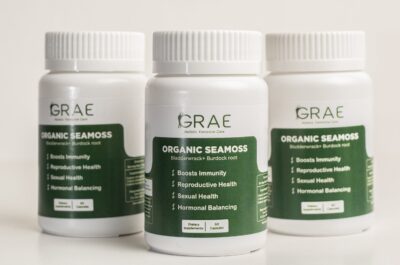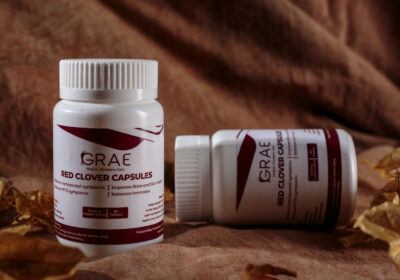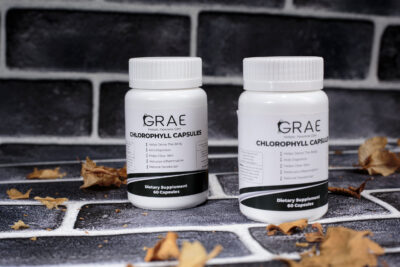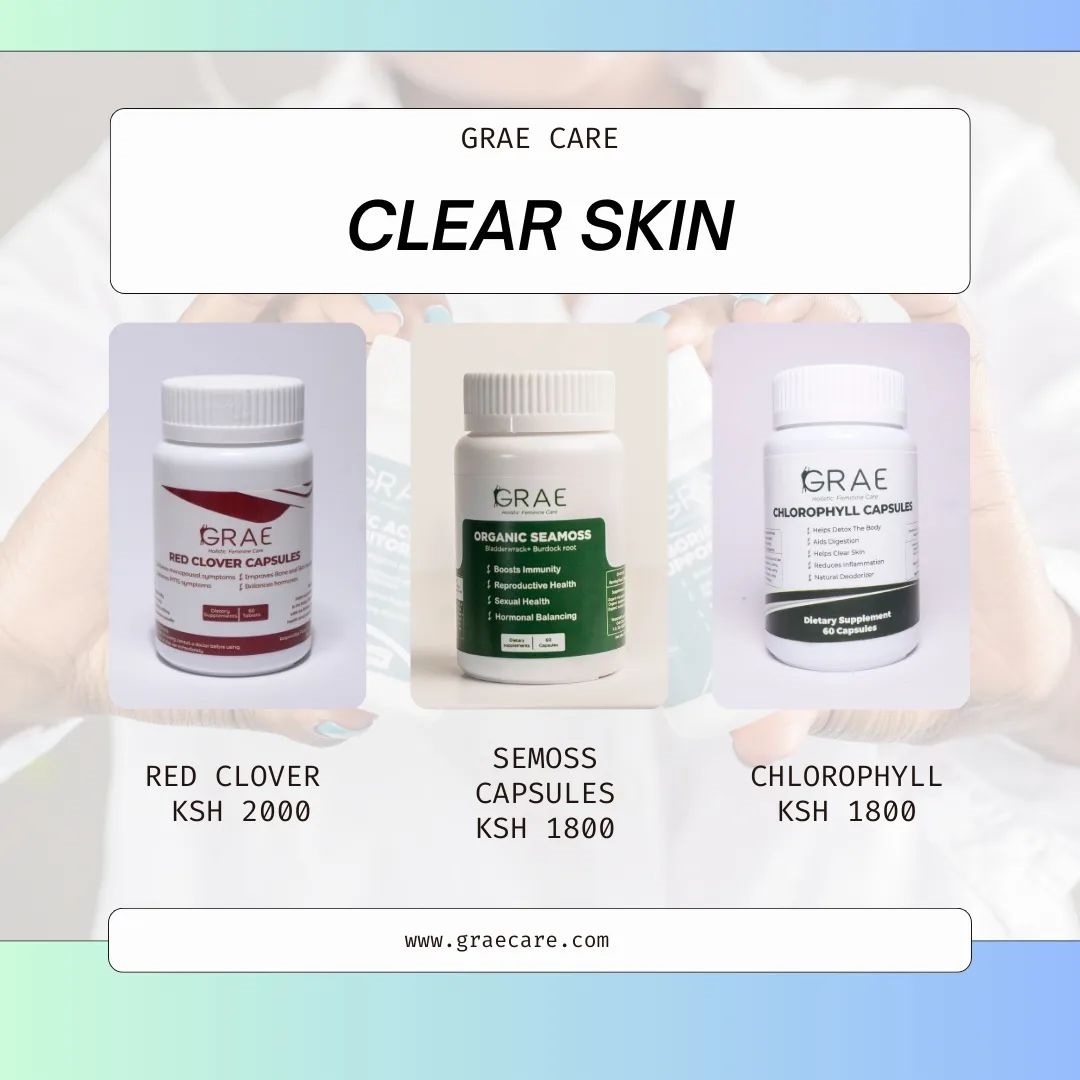Your cart is currently empty!
Good skin brings confidence, and that glow that comes with a good skin helps makes us feel really good about ourselves. There are natural supplements that we can take to give us that glow. First, let us look at some of the causes of skin problems in women.
Causes of skin problems in women
Hormonal Changes: Fluctuations in hormone levels, particularly during puberty, menstruation, pregnancy, and menopause, can contribute to acne breakouts and changes in skin texture. Hormonal imbalances can stimulate the sebaceous glands to produce excess oil, leading to clogged pores and acne. Additionally, hormonal fluctuations can affect skin hydration and collagen production, contributing to dullness and uneven texture.
Genetics: Genetic predispositions can play a significant role in determining a woman’s susceptibility to acne, dull skin, and other skin conditions. Women with a family history of acne or skin problems may be more prone to experiencing similar issues themselves.
Poor Skincare Habits: Inadequate skincare practices, such as infrequent cleansing, using harsh or inappropriate skincare products, or failing to moisturize properly, can contribute to acne breakouts and dull skin. Improper skincare can lead to the buildup of dead skin cells, bacteria, and excess oil, clogging pores and causing acne. It can also result in a lack of hydration and protection, leading to dull, lackluster skin.
Diet: Poor dietary habits, such as consuming excessive amounts of processed foods, refined sugars, and unhealthy fats, can contribute to skin problems like acne and dullness. Diets lacking in essential nutrients, antioxidants, and hydration can deprive the skin of the nourishment it needs to maintain a healthy, radiant appearance.
Stress: Chronic stress can trigger hormonal imbalances and inflammatory responses in the body, leading to increased sebum production, inflammation, and acne breakouts. Stress can also impair skin barrier function, making the skin more susceptible to damage and dullness.
Environmental Factors: Exposure to environmental pollutants, UV radiation, harsh weather conditions, and irritants can damage the skin’s protective barrier, leading to inflammation, oxidative stress, and skin problems. UV radiation, in particular, can exacerbate acne and contribute to premature aging and dullness.
Medications and Hormonal Treatments: Certain medications, such as corticosteroids, hormonal contraceptives, and hormone replacement therapies, can affect hormone levels and contribute to acne breakouts and other skin issues in women.
Underlying Medical Conditions: Certain medical conditions, such as polycystic ovary syndrome (PCOS), thyroid disorders, and hormonal imbalances, can manifest as skin problems like acne and dullness. Treating the underlying medical condition may help improve skin health.
How hormonal imbalance causes skin problems
Acne: Fluctuations in hormone levels, such as those that occur during puberty, menstruation, pregnancy, or menopause, can trigger or exacerbate acne in women. Hormonal acne often appears along the jawline, chin, and lower cheeks and may manifest as deep, cystic lesions.
Oil Production: Hormonal imbalances, particularly elevated levels of androgens (male hormones), can stimulate the sebaceous glands to produce excess oil (sebum). This can lead to oily skin, clogged pores, and an increased risk of acne breakouts.
Dryness: Conversely, hormonal fluctuations or imbalances can also lead to dry skin by disrupting the skin’s natural oil production. This can result in dry, flaky patches, rough texture, and increased sensitivity.
How nutrition and diet can cause skin problems
Inflammation: Diets high in processed foods, refined sugars, and unhealthy fats can promote inflammation throughout the body, including the skin. Chronic inflammation can exacerbate skin conditions such as acne, eczema, and psoriasis, and may contribute to premature aging.
Dullness: A lack of essential nutrients, such as vitamins, minerals, and antioxidants, can deprive the skin of the nourishment it needs to maintain a healthy, radiant appearance. This can lead to dull, lackluster skin with uneven texture and tone.
Delayed Wound Healing: Poor nutrition can impair the body’s ability to repair and regenerate skin tissue, leading to delayed wound healing and increased susceptibility to infections and injuries.
Increased Sensitivity: Nutrient deficiencies can compromise the skin’s barrier function, making it more susceptible to external irritants and allergens. This can result in increased sensitivity, redness, and irritation.
Premature Aging: Diets lacking in antioxidants and other skin-protective nutrients can accelerate the aging process by leaving the skin vulnerable to oxidative stress and damage from environmental factors such as UV radiation and pollution. This can lead to the formation of wrinkles, fine lines, and age spots at a younger age.
How seamoss helps with better skin

Sea moss, also known as Irish moss or carrageenan moss, is a type of seaweed that’s rich in nutrients like vitamins, minerals, and antioxidants, which can contribute to healthier skin in several ways:
Hydration: Sea moss is high in mucilage, a substance that becomes gel-like when mixed with water. This can help to hydrate the skin, keeping it moisturized and preventing dryness, which is essential for maintaining healthy skin.
Minerals: Sea moss contains a variety of minerals such as magnesium, calcium, and potassium, which are crucial for maintaining the skin’s barrier function and overall health. These minerals help to support skin cell renewal and repair, leading to a more youthful and radiant complexion.
Collagen production: Sea moss is rich in sulfur compounds, which are essential for the production of collagen, a protein that helps to maintain the skin’s elasticity and firmness. By promoting collagen production, sea moss can help to reduce the appearance of wrinkles and fine lines, giving the skin a smoother and more youthful appearance.
Antioxidant properties: Sea moss contains antioxidants like vitamin C and flavonoids, which help to protect the skin from oxidative stress caused by free radicals. This can help to prevent premature aging and reduce the risk of skin damage from environmental factors like UV radiation and pollution.
Anti-inflammatory effects: Sea moss contains compounds with anti-inflammatory properties, which can help to reduce redness, irritation, and inflammation in the skin. This makes it beneficial for soothing conditions like acne, eczema, and psoriasis.
Overall, incorporating sea moss into your diet or skincare routine can help to promote healthier, more radiant skin for women. However, it’s essential to remember that individual results may vary, and it’s always a good idea to consult with a healthcare professional before making significant changes to your diet or skincare regimen.
How Red Clover helps with better skin

Red clover is a plant that has been used for centuries in traditional medicine for various health benefits, including promoting skin health in women. Here’s how it can help:
Isoflavones: Red clover contains isoflavones, which are plant-based compounds with estrogen-like effects. These isoflavones, such as genistein and daidzein, can help balance hormone levels in women, particularly during menopause when estrogen levels decline. Balanced hormone levels can contribute to healthier skin by reducing dryness, improving elasticity, and minimizing the appearance of wrinkles.
Antioxidants: Red clover is rich in antioxidants like vitamin C and flavonoids, which help protect the skin from oxidative stress caused by free radicals. By neutralizing free radicals, antioxidants can help prevent premature aging, reduce the appearance of fine lines and wrinkles, and promote overall skin health.
Anti-inflammatory properties: Red clover contains anti-inflammatory compounds that can help reduce inflammation in the skin. This can be beneficial for women dealing with inflammatory skin conditions like acne, eczema, or rosacea, as it can help soothe irritation and redness.
Collagen support: Some studies suggest that isoflavones found in red clover may support collagen production in the skin. Collagen is a protein that provides structure and elasticity to the skin, and maintaining healthy collagen levels is essential for preventing sagging and maintaining a youthful appearance.
Moisturizing properties: Red clover extract is often used in skincare products for its moisturizing properties. It helps hydrate the skin, leaving it soft, smooth, and supple. This can be particularly beneficial for women with dry or dehydrated skin.
Skin brightening: Some anecdotal evidence suggests that red clover may help brighten the skin and reduce the appearance of dark spots or hyperpigmentation. While more research is needed to confirm these effects, some individuals may find red clover beneficial for achieving a more even skin tone.
How Chlorophyll helps with better skin

Chlorophyll is the green pigment found in plants that plays a crucial role in photosynthesis. While its benefits for skin health are still being researched, some suggest that chlorophyll may offer several advantages for women’s skin:
Antioxidant properties: Chlorophyll is rich in antioxidants, which can help protect the skin from damage caused by free radicals. Free radicals are unstable molecules that can lead to premature aging, such as wrinkles, fine lines, and age spots. By neutralizing free radicals, antioxidants in chlorophyll can help maintain youthful-looking skin.
Anti-inflammatory effects: Chlorophyll has been shown to have anti-inflammatory properties, which can help reduce redness, swelling, and irritation in the skin. This makes it potentially beneficial for women with inflammatory skin conditions like acne, eczema, or rosacea.
Detoxification: Some proponents suggest that chlorophyll may help detoxify the skin by promoting the elimination of toxins and impurities. By supporting the body’s natural detoxification processes, chlorophyll may contribute to clearer, healthier-looking skin.
Wound healing: Chlorophyll has been studied for its potential wound-healing properties. Some research suggests that chlorophyll may help accelerate the healing process of wounds, cuts, and abrasions by promoting tissue repair and regeneration. This could be beneficial for women dealing with skin injuries or post-inflammatory hyperpigmentation.
Deodorizing effects: Chlorophyll is sometimes used as a natural deodorant due to its ability to neutralize odors. While this may not directly impact skin health, it can help women feel more confident about their skin’s freshness and cleanliness.
Hydration: Some sources suggest that chlorophyll may help improve hydration levels in the skin, leading to a more plump, supple appearance. By attracting moisture to the skin and enhancing its barrier function, chlorophyll may help prevent dryness and maintain optimal skin health.

